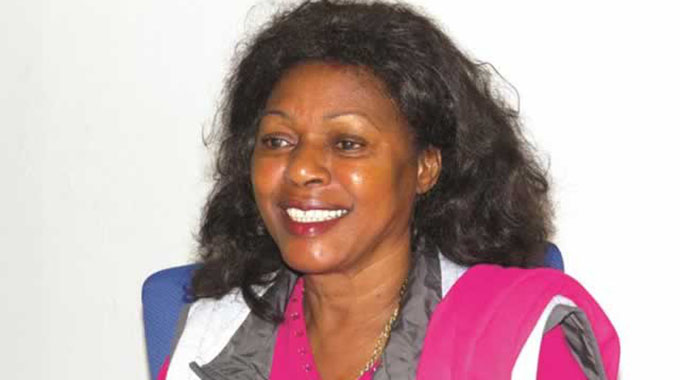ICON FOR FEMALE PRISONERS
Ruth Butaumocho Gender Editor
When Dr Rita Nyampinga was arrested and briefly detained in Harare’s police cells following a demonstration to push for the availability of anti-retroviral therapy in 2007, the conditions she was exposed to shocked her. She spent the night wide awake, trying to imagine how life would be if she was to be incarcerated for longer than a week.
With a bucket in the corner that served as a urinary for her and six others, she did not have an idea where to dispose of her soiled sanitary pad – in full glare of other inmates. The experience haunted her for five years until she decided to do something and change lives of hundreds of female prisoners incarcerated in jails in Zimbabwe for different crimes.
Her decision gave birth to the Female Prisoners Support Trust, where she is the director, spearheading different rehabilitation programmes for female prisoners and ex-convicts:
“My heart went for the female populace who due to their different physical and biological make up were likely to be more traumatised than their male counterparts.
“It is a cause at the core of my heart that I am passionate about.”
Driven by a passion to ensure that female prisoners were adequately catered for during and after incarceration, Dr Nyampinga carried out extensive research on some of Africa’s best practices on jails that she could use for the project.
“The conditions were almost similar everywhere. Of course other situations were better, and I wanted ours to be user friendly for women. I told myself that it had to be different,” recalled Dr Nyampinga.
Operating without any financial resources and an office did not make the task easier, but she did not give up.
“At one time I had to use my own resources and move around with a begging bowl to friends, colleagues and relatives, to ensure that the project kicks off,” she recalls.
Her perseverance paid off resulting in the registration of the trust.
Formed in 2010, but legally registered in 2012, Female Prisoners Support Trust, creates platforms where female prisoners meet and share pertinent issues affecting them. It also mobilises resources for use by female prisoners such as sanitary pads, while lobbying with prison officials for better conditions for female prisoners.
Because of the prevailing economic conditions, the trust also gives starter packs in form of groceries to female prisoners released and need somewhere to start.
“Life becomes unbearable for female ex-convicts when they are released from prison especially after serving sentences for murder, infanticide and other serious crimes. More often than not, they come back to find that their husbands have remarried or relatives simply don’t want them back.”
Since the inception of the organisation it has to date helped about 20 women by setting them up using the skills acquired through rehabilitation programmes while in prison.
“Some of these skills include arts and crafts, gardening, poultry, hairdressing and pre-school teaching. As an organisation, we source for them some of the markets and assist them in identifying new opportunities, to ensure that they are economically secure,” she said.
As part of its mandate, the trust also plays a pivotal role in ensuring that the ex-convict is integrated back into her family that often has misgivings depending on the nature of the crime she served term for.
“Society is still to come to terms with the fact that women can commit crimes as men. Women are often regarded as timid, nurturing and not able to perpetrate violent crimes.
“But our experience over the years, have actually shown that they are also committing crimes and there are usually extenuating circumstances attached to that, something that society is not yet prepared to accept.
“It is usually in such cases, when have to come in and counsel the family to accept the ex convict with the varying degrees of crimes,” she said.
Having worked with female prisoners and ex-convicts she has come across different cases, with the most memorable one being of a woman who was chased away together with her 12-year-old son, after she had served seven years for stock theft.
“We initially gave groceries and the family took her back. When the groceries ran out, they chased her away with her son saying they could not deal with an ex-prisoner.
“We had to rope in the headman who eventually offered her a place to stay and she has since been reconciled with her three children,” she said.
Dr Nyampinga says despite the positive spin off the project, her efforts have not been without stigma.
For her philanthropic activity, Dr Nyampinga has earned herself names, among them titles “Mai Chenzira” and “Vekumajeri” perpetuating societal stereotypes where felons and those associated with them are condemned even in death.
“Society still has its own reservations in dealing with prisoners and ex-convicts, a situation which makes it difficult to have them fully integrated in society. Far from being accepted, ex-convicts are usually stigmatized, forcing the majority to commit crimes and are sent back to prison.”
With no formal financial base to hinge the activities of the trust, Dr Nyampinga relies on the goodwill of companies and individuals to ensure that the cause of female prisoners is taken aboard.
“We do not get funding from anyone, but have to rely on the goodwill of corporate organisations and individuals to fund our activities. With the prevailing conditions, the resources continue to dwindle but, I am not discouraged,” she said.
Dr Nyamupinga says her primary aim is not to encourage commission of crime by women hoping to get off by playing up the gender sympathy card.
“We are not condoning the heinous activities of women, but we want them to be rehabilitated in non-violent judgmental manner, while giving them a second chance to lead a better life,” she said.
A teacher by profession, Dr Nyampinga has over the years tried her hands on everything including working for a big telecommunications company where she spent more than 10 years.
When she left the telecoms company, she joined the Zimbabwe Coalition on Debt and Development as a board member representing the gender cluster.
At one time she worked with the Zimbabwe Women’s Writers and was part of the group that produced a book titled “Tragedies of Life” that looks at trials and tribulations of women from different walks of life.
A holder of an honorary degree from the International Institute of Philanthropy, Dr Nyampinga believes that giving people a second chance in life is an integral part of making the world a better place for all.
“We can only create a better society by also contributing to its well being,” she philosophises.
◆ Feedback [email protected]







Comments